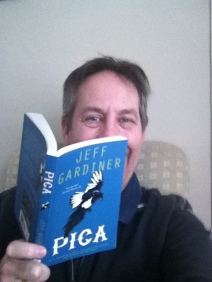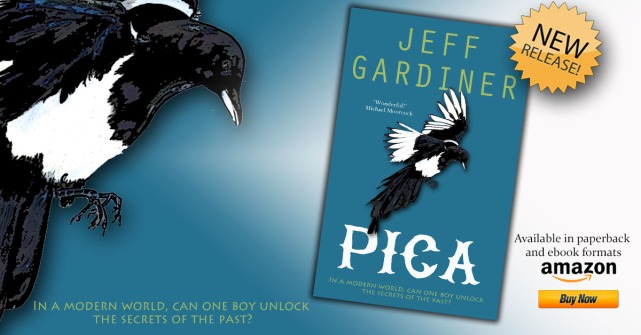Today we have a guest blog by Jeff Gardiner, whose novel ‘Pica’ is out now. Welcome Jeff!
 My new YA novel, Pica, is the first book in the Gaia trilogy, which explores our relationship with the natural world as individuals and as humanity as a whole. Gaia is, of course, Mother Nature, and teenager Luke is challenged to find Gaia, but isn’t certain where to start looking. He becomes embroiled in adventures that involve shape-shifting, surviving the wilderness, and – perhaps hardest of all – trying to convince people that we are destroying the very planet we live on. Who is going to listen to one boy when we struggle to be convinced by leading scientists and world politicians?
My new YA novel, Pica, is the first book in the Gaia trilogy, which explores our relationship with the natural world as individuals and as humanity as a whole. Gaia is, of course, Mother Nature, and teenager Luke is challenged to find Gaia, but isn’t certain where to start looking. He becomes embroiled in adventures that involve shape-shifting, surviving the wilderness, and – perhaps hardest of all – trying to convince people that we are destroying the very planet we live on. Who is going to listen to one boy when we struggle to be convinced by leading scientists and world politicians?
As a teacher and author who visits schools, it concerns me that many teenagers take little interest in the natural world. When I talk of the sense of wonder experienced when walking in the Lake District, or the feeling of awe I’ve felt when diving, or touring through the wilds of Kenya, it’s often met with blank faces. Of course there are a few who will connect with the poetry of Wordsworth or Ted Hughes, or perhaps an extract by Gerald Durrell, but to the majority it’s another dull lesson of meaningless words.
Whilst last year’s United Nations Climate Change Conference meant 195 countries agreed to reduce carbon emissions, some critics were left wondering if the resolutions were in fact enough. Friends of the Earth described the agreements as “not sufficient”. For the UK, we need to ask whether leaving the EU will affect our continuing and important environmental achievements. The Green Party argue that, “It’s only by working with our European neighbours that we can tackle climate change, protect wildlife and reduce pollution”. We’ve done too much damage in such a short space of time. We are killing our planet rather than facing our responsibilities towards it. What a strange way to behave.

I’ve always been inspired by nature. The times when I most feel alive are when I’m walking in a forest, on a hillside or by a lake. It’s difficult to explain to someone else the thrill of seeing a murmuration of starlings, or of sailing on the ocean alongside a breaching whale, but these moments affect you in ways you can’t easily express.
Our relationship with nature as a human race is an odd one. After all, we are animals – part of nature. And yet we often seem to be at odds with nature, as if we’re not actually part of it. We cut down forests and build concrete jungles; we pollute and urbanise as if we own the place. We seem to have forgotten our place in creation; our relationship with other animals and the wonderful world that is our home. How many families go for walks and holidays in the countryside these days? I have often felt that many of us have lost our connection with nature. Rather than struggle against it, we should embrace it and rediscover the powers that might afford us.
Pica picks up on this idea.
Luke plays violent computer games and hates the idea of a boring rural walk. One day a magpie taps on his window, and from then on he sees magpies everywhere. A new boy, called Guy, joins his school and is bullied for being a little odd. However, Luke is drawn to this strange boy, and as he gets to know him everything he understood about his life is turned upside down.
I want Pica to challenge people’s perceptions about young people and about our relationship with the natural world. In the past we understood things that have now been lost over the years. Luke begins a journey to rediscover that ancient magic.
I was also keen to make this novel – and the trilogy – a fantasy. Fantasy literature allows us to use our imaginations in our understanding of reality. Luke discovers powers that many of us can only dream about, so there is also a sense of wish-fulfilment alongside the serious environmental message. Imagine if we could shape-shift into an animal that represents our soul? In Pica these ‘spirit-animals’ are known as ‘numens’, which is a lovely archaic word linked with ‘numinous’, which implies the presence of a deity or something supernatural. If there is a creator or a mother nature then perhaps it’s not something ‘out there’ at all – not a lurking distant presence – but instead it’s part of us…within us…or it is us.
If Pica makes readers aware of the threat to our dying planet, or prompts more teenagers to appreciate our beautiful world and the awe-inspiring creatures within it, then it will have done its job. Of course, I’m also hoping that they finding it a thrilling read too.
*******************************************************************
Jeff Gardiner is a YA author, whose other novels include Myopia – which is about bullying and ways of coping as a victim of prejudice. Pica has been described by fantasy author, Michael Moorcock, as, “An engrossing and original story, beautifully told. Wonderful!”
For more information see Jeff’s website or the Accent Press website


Thanks for letting me post on Paisley Piranha.
Jeff
LikeLike
Pingback: It’s Not Easy Being Green by Jeff Gardiner | Jeff Gardiner's Blog
great post. I think Pica sounds like a book I would have loved to write myself! Although magpies might be one of the few species that will do all right as we go forward – they certainly seem to have figured out how to live with us in our pedicured parks. Hope the word rewilding pops up in this or the other two parts of the trilogy.. 🙂
LikeLiked by 1 person
Thanks David
Rewilding is certainly part of Luke and Guy’s plan. I’ll see what I can do.
Cheers
Jeff
LikeLike
Fab interview, wishing you all the best with the book and convincing kids to get out into nature and enjoy it.
LikeLiked by 1 person
Thanks, Jane
LikeLiked by 1 person
Most welcome.
LikeLike